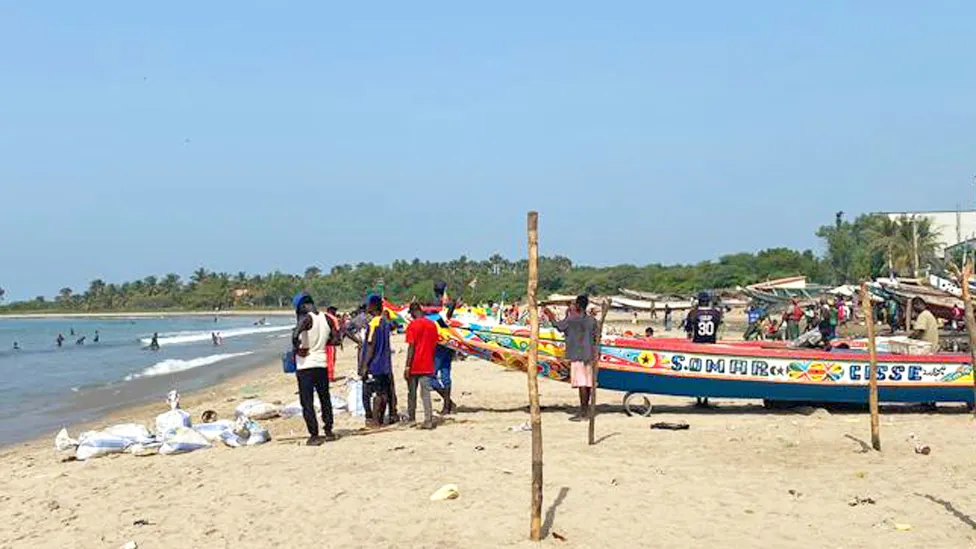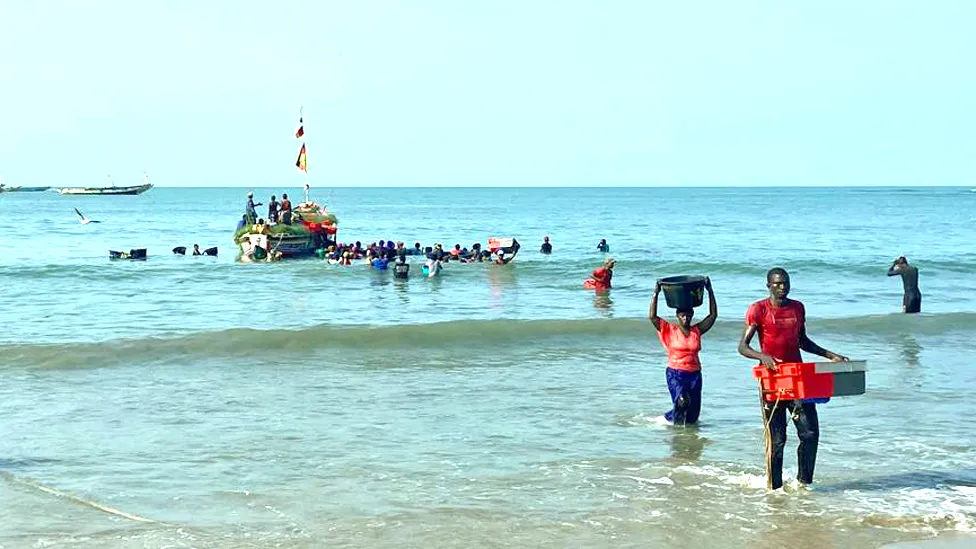The fishy business of a Chinese factory in The Gambia
Investment from China welcomed by The Gambia's government is causing upset for a fishing community who say a Chinese-owned fishmeal factory is disrupting life on their shores.
"I have been working here for 32 years," says Buba Cary, a fisherman from Gunjur speaking in Mandinka through a translator. "It only brings suffering for us," he says, gesturing to the white building.
"Before the factory came here there was a lot of fish in the sea. If you want fish [now] you need to cross the border to Senegal or Guinea-Bissau."
Kelepha Camara, who comes to this shore to buy fish and sell it up country, agrees, arguing that it has pushed up the cost of fish for locals: "This factory is not supporting us."
These men are talking about a facility run by Golden Lead in the coastal village of Gunjur, which is around 45km (28 miles) south of the capital, Banjul.
In total The Gambia now has three of these factories - the other two, run by different firms, are about 10km north and south of Gunjur, where fish oil and fishmeal are produced and exported to China, Europe and beyond.
For many years the fishmeal industry has raised questions about sustainability. It uses vast quantities of fish, such as sardinella and bonga, which make up at least half of The Gambia's total protein intake.
The Dutch non-governmental organisation Changing Markets Foundation found that the biggest of these fishmeal factories accounted for 40% of Gambia's entire fish catch for a year.
The Gambia has fostered a close relationship with China in recent years. Under the controversial leadership of ex-President Yahya Jammeh the first Chinese fish factory to open was in Gunjur, after it was granted a 99-year lease in 2015 soon after The Gambia broke ties with Taiwan.
This is despite the fact that Gambian law prohibits foreign nationals leasing land for more than 26 years, according to the political watchdog Watch Gambia.
Not long after Mr Jammeh reluctantly left power in 2017 and went into exile after 22 years at the helm - an era exposed by the Truth, Reconciliation and Reparations Commission for its widespread human rights abuses and corruption - his successor met with his Chinese counterpart to reiterate their friendship.
That year China cancelled $12m ($10m) of Gambian debt and invested a further $28.7m in agriculture and fisheries.
Wildlife reserve polluted
Yet the local community in Gunjur was already unhappy about how things were going with Golden Lead.
On 22 May 2017 - nearly a year after the fishmeal factory opened - the lagoon in the Bolong Fenyo, a nearby wildlife reserve, filled with dead fish and turned a deep red.
The next month, the National Environment Agency filed a case against Golden Lead at a magistrates' court, alleging wastewater from the factory had caused the damage.
But operations were speedily resumed after an out-of-court settlement of $25,000 was reached.
Aside from the pollution issue, the company was brought up in another court case.
Last month, Bamba Banja, a former top civil servant in the fisheries ministry, was found guilty of corruption for receiving at least five payments of $1,600 between 2018 and 2020 from Golden Lead. He denied he had taken the money to free vessels detained for being involved in illicit fishing, but was jailed for two years and ordered to pay a fine.
Some in the community in Gunjur are still worried about standards over waste pollution and various fishermen and factory workers told the BBC in December 2022 that they had experienced skin problems after entering the sea near the factory. But there is no definitive evidence that these ailments are the fault of the factory.
For most in Gunjur it is the lack of fish that angers them - they say stocks are being overfished.
Golden Lead secures six-month contracts with mostly Senegalese fishermen who use powerful boats. Local fishermen using pirogues are unable to compete.
The factory buys in bulk, paying $5 a basket - three times less than it fetches at local markets. Some fishermen agree to this as it is a guaranteed sale, but it means less fish is available to locals and Gambians who do sell to Golden Lead are making less money.
The sheer volume of fish needed for processing can be witnessed when the catch is brought in.
As the boats arrive for the factory, scores of men run up and down the beach with the heavy 50kg (110lb) baskets on their heads - each paid $0.50 a trip.
The knock-on effect is that fish is becoming more scarce in the local market - and increasingly expensive.
Gunjur residents also complain that Golden Lead has broken commitments made to the fishing community.
"They promised to build a road from the village to the beach and they promised to build a fish market for the community. They promised 600 jobs here in the community," Dembo Darboe, the chief of Gunjur village, known as an "alkalo", told me.
None of this has happened, though he says the village does receive a monthly payment of around $815.
"Compared to what they have this is nothing," the chief said.
"We can show our dislike. But the power is in the hands of the government."
According to a worker at the factory, who requested anonymity, only 40 Gambians are employed at Gunjur's Golden Lead plant, where conditions are poor and the pay unsatisfactory at about $60 a month, paid in cash.
"They deduct money from my salary for income tax and social security. I don't even have a social security account or number," he said.
https://www.bbc.com/news/world-africa-65204179






Post a Comment